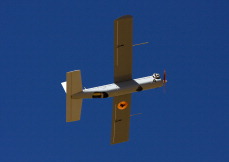ISLAMABAD, Pakistan, April 20, 2011 — Military-to-military ties between the United States and Pakistan remain good despite recent tensions between the two countries, the chairman of the Joint Chiefs of Staff said here today.
Navy Adm. Mike Mullen cited outcry over Raymond Davis — an American who was accused of two murders and left Pakistan after the victims’ families were financially compensated — and U.S. drone strikes as factors in strained relations between the countries.
Mullen spoke to Pakistani journalists before a meeting with Gen. Ashfaq Parvez Kayani, the Pakistani army’s chief of staff. The chairman said that despite differences between the United States and Pakistan, many issues draw the countries together. Those issues run the gamut of economic and political ties, as well as security challenges, he added.
“I acknowledge that over the challenges that exist over addressing these threats, first of all, we will have our ups and downs,” Mullen said. “We will have our agreements and disagreements, and I certainly don’t disagree that the Davis case and the strike that followed immediately thereafter was a huge setback.” But the relationship he has with senior military leaders here has allowed them to frankly state their views and move ahead, he added.
Mullen said he will discuss the Haqqani network, which aids the Taliban, with Pakistani leaders.
“I have a sacred responsibility to do all I can to save American lives,” he said. “The Haqqani network very specifically supports the Taliban, who move into Afghanistan to kill Americans. I can’t accept that. I’ll do everything I possibly can to prevent that, specifically.”
The most difficult challenge posed by the Taliban threat in Afghanistan is addressing the support the Taliban receive from the Haqqani network, Mullen said. The Inter-Services Intelligence agency of the Pakistani military, known as ISI, has had a long relationship with the Haqqani network.
“Addressing the network is, from my perspective, critical to the solution set in Afghanistan,” Mullen said. “The reality is the Haqqani [network] is supporting, funding [and] training fighters that are killing Americans, killing coalition partners. I have a sacred obligation to do all I can to make sure that doesn’t happen.”
The ISI has worked with these groups to protect their country, the chairman said. “I understand the strategic relationships that the ISI has had in the region over time,” told reporters. “I understand the ISI and military -– like all militaries and intelligence agencies — has as a priority to take care of its own country.
“Sometimes, we obviously disagree as to how that’s done,” he continued. “But where it affects the lives of … American military who are fighting in Afghanistan, I have grave concerns that anything that could support organizations like Haqqani, … it is my responsibility [to act].”
Mullen said al-Qaida has been set back, but still is a force. The terror organization’s leadership still lives in Pakistan’s federally administered tribal area, he said, and they still threaten the United States. He credited the Pakistani government with stepping up its fight against terrorism within the country’s borders.
“What the Pakistani government and military has done to address the terrorist problem inside Pakistan has been significant,” the chairman said. “I give the Pakistan military a lot of credit. Some of those units have been up on the frontier fighting for two years. That’s a long time. There is no easy solution for this threat.”
As he has in the past, Mullen noted that a deficit of trust has existed between the United States and Pakistan since the United States cut off military contacts between the two countries in 1990. The military-to-military relationship re-started in 2002, he said, but the effects of the rift still are being felt.
“We can’t just snap our fingers and say ‘OK, we trust each other now,’ ” he said. “This has to be carefully and constantly worked on.”
Source:
U.S. Department of Defense
Office of the Assistant Secretary of Defense (Public Affairs)

 von
von 